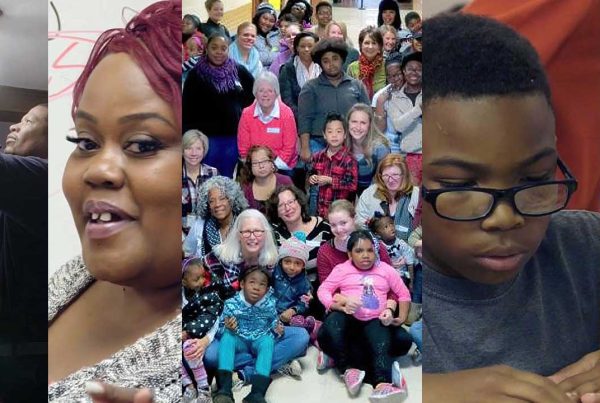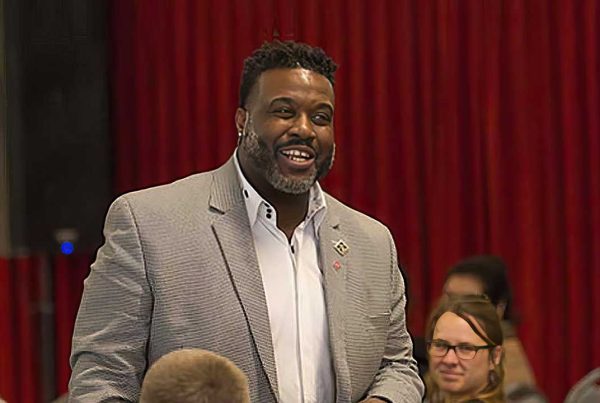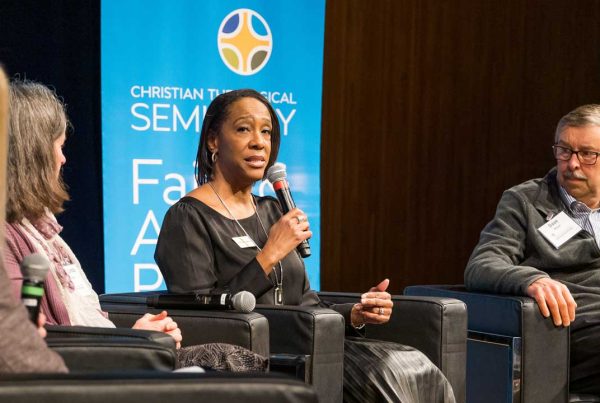A Willingness to Change
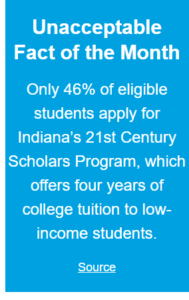 School on Wheels knows what it’s doing. After all, it’s been steadily growing for nearly 20 years, helping children affected by homelessness perform better in school. Starting with two staffers and a handful of volunteers, it now deploys more than 400 volunteers to 16 partner sites throughout the city to provide educational support to nearly 400 children.
School on Wheels knows what it’s doing. After all, it’s been steadily growing for nearly 20 years, helping children affected by homelessness perform better in school. Starting with two staffers and a handful of volunteers, it now deploys more than 400 volunteers to 16 partner sites throughout the city to provide educational support to nearly 400 children.
But School on Wheels, a 2017 Faith & Action Grant recipient, doesn’t measure success by the number of kids it serves or the number of sites where it offers services. It looks at factors such as classroom performance, parental engagement and school attendance – factors that also reveal a record of meaningful success.
What impresses us most about School on Wheels’ success is that it doesn’t prevent the School on Wheels team from critically assessing their work and looking for ways to improve. When they did that recently, they identified some new opportunities. Although the organization was founded on one-on-one tutoring for children in homeless shelters, studies show that children continue to struggle even after families find stable housing … especially if a return to stable housing resulted in a change in schools.
So School on Wheels pivoted a bit, adding school-based services that help kids after they emerge from homelessness, and developing services in support of parents and providing guidance around school choice, which reduces the need for children to change schools every time they change addresses. The result? More success for children and families.
We are inspired by School on Wheels’ example. Its team has succeeded but remained open to change. They are focus on transformational outcomes rather programs and activities. They pursue innovation and try the untried, because that’s what it takes to make a difference. And they attack a root cause of poverty – a lack of educational attainment – rather than simply only addressing an immediate need.
School on Wheels is part of the solution, not because it came up with the perfect program or approach when it was launched two decades ago, but because it continues to seek the solution that will have the greatest impact over the long term. We all can learn from that example.
Lindsey Nell Rabinowitch
Project Director, Faith & Action Project
April 30: Spring Conference
 In a city that ranks as the nation’s 15th worst for concentrated poverty, we will find solutions only by engaging in a concerted, collaborative effort to listen, share, innovate and connect. Join us on April 30 to be a part of that effort, as faith communities, local government, nonprofit organizations, concerned individuals and people living on poverty’s frontlines gather to learn about and shape solutions that increase opportunities for people in their neighborhoods and throughout the city. Nisha Patel, former executive director of the Urban Institute’s US Partnership on Mobility from Poverty and former Managing Director of the Robin Hood Foundation, will keynote the event, which be held at St. Luke’s Methodist Church. Registration available in March.
In a city that ranks as the nation’s 15th worst for concentrated poverty, we will find solutions only by engaging in a concerted, collaborative effort to listen, share, innovate and connect. Join us on April 30 to be a part of that effort, as faith communities, local government, nonprofit organizations, concerned individuals and people living on poverty’s frontlines gather to learn about and shape solutions that increase opportunities for people in their neighborhoods and throughout the city. Nisha Patel, former executive director of the Urban Institute’s US Partnership on Mobility from Poverty and former Managing Director of the Robin Hood Foundation, will keynote the event, which be held at St. Luke’s Methodist Church. Registration available in March.
The People Closest to the Solution
A key tenet of the US Partnership on Mobility from Poverty’s anti-poverty work is the need to “change the narrative” about poverty, and one key aspect to narrative change is including the people closest to the problem in the pursuit of a solution, says Nisha Patel, who formerly served as the Partnership’s executive director and who will be a featured speaker at the 2020 Faith & Action Project Spring Conference (see above). “There is no company in the world out there that would roll out a product without testing it with consumers, but in policy we do this all the time,” Patel said in a September 2019 interview. “We need people who are impacted by the problem at the table early and often.”
More than a Job
 When WORLD, a news website that seeks to report from a Christian worldview, wanted to shine a light on the challenges faced by some workers in a thriving job market – and on potential solutions – it aimed its beam at Faith & Action grant recipient Purposeful Design. In a recent story, WORLD noted that, “Instead of expecting homeless people or others to just ‘get a job,’ Christians must recognize the barriers facing people looking for work.” The story continued, “It could even mean imitating [Purposeful Design founder] David Palmer, who started a business that offered more than just a job.”
When WORLD, a news website that seeks to report from a Christian worldview, wanted to shine a light on the challenges faced by some workers in a thriving job market – and on potential solutions – it aimed its beam at Faith & Action grant recipient Purposeful Design. In a recent story, WORLD noted that, “Instead of expecting homeless people or others to just ‘get a job,’ Christians must recognize the barriers facing people looking for work.” The story continued, “It could even mean imitating [Purposeful Design founder] David Palmer, who started a business that offered more than just a job.”
Worth Reading
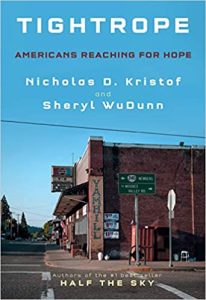 Tightrope, by Nicholas Kristof and Cheryl WuDunn. For this book offering poignant snapshots of hopelessness alongside a fact-driven critique of how America treats the “least of these,” Kristof and WuDunn visited with Kristof’s childhood friends in his hometown, Yamhill, Ore. What they reveal is that Yamhill offers a reflection of too many American towns: Once a prospering community, Yamhill found itself adrift after manufacturing jobs evaporated, and seized by poverty, drugs, alcohol abuse, broken families and problems passed from one generation to the next. But this isn’t just a sad tale. Kristof and WuDunn look beyond the trauma to offer glimpses of hope and examples from around the country of people and communities finding ways to overcome today’s challenges.
Tightrope, by Nicholas Kristof and Cheryl WuDunn. For this book offering poignant snapshots of hopelessness alongside a fact-driven critique of how America treats the “least of these,” Kristof and WuDunn visited with Kristof’s childhood friends in his hometown, Yamhill, Ore. What they reveal is that Yamhill offers a reflection of too many American towns: Once a prospering community, Yamhill found itself adrift after manufacturing jobs evaporated, and seized by poverty, drugs, alcohol abuse, broken families and problems passed from one generation to the next. But this isn’t just a sad tale. Kristof and WuDunn look beyond the trauma to offer glimpses of hope and examples from around the country of people and communities finding ways to overcome today’s challenges.
Mark your calendar for this important date.
April 30, 2020: Faith & Action Spring Conference


